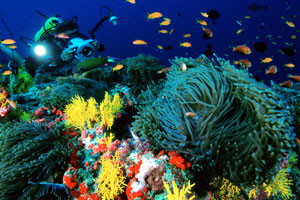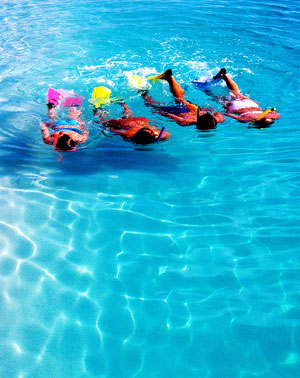BAA ATOLL, MALDIVES — We are lured to this nation of turquoise water and lush tropical islands by lovely brochure photos featuring luxurious thatched-roofed resort villas suspended on stilts and by promises of sun-drenched days and romantic orange glow sunsets.
Once here, we lounge around private villa pools; leave our footprints on the sugary shore; dip our masked faces in warm salty waters to marvel at incredible sea life; swim up to pool-side bars and enjoy sweet drinks infused with local tropical fruits; dine on freshly caught seafood; and allow our bodies to be dipped in oil and massaged endlessly in search of physical euphoria.
As inviting and enjoyable all that is, upon arriving you quickly learn that there is so much more to the Maldives than breathtaking good looks and escapism resorts.
This Indian Ocean jewel – a necklace of 1,190 coral reef islands – is an ecological wonderland of rare species, fragile flora and fauna and delicate sea life, says Guy Stevens, one of the guardians of this global treasure.
As head marine biologist at the fabulous Four Seasons Resort Landaa Giraavaru – the luxury hotel chain also has another 5-star property on the Maldivian island of Kuda Huraa in the North Malé Atoll – Stevens and his resort staff make it a point of educating guests to the area’s fragile eco system and show them how they can enjoy its many wonders while respecting its delicate status.
“We’re not going to change global warming or anything like that,” says Stevens, who is also head of the non-profit Maldivian Manta Ray Project, whose research into the Indian Ocean’s manta ray population has been recognized worldwide.
“By showing Four Seasons guests the important role the manta and other species play in the delicate eco balance of the Maldives, they’ll understand how important our work is and how important it is for them to respect that ecosystem.”
Part of the thrill of coming here is to immerse yourself in the aquatic activities offered at the Four Seasons resorts - from scuba diving and snorkeling, to sunset cruises and daily expeditions to see spinner dolphins and manta rays in their natural habitat.
Through a series of lectures and information sessions, resort guests learn that the flying-saucer-shaped manta is actually a member of the shark family and has the largest brain among all shark and ray species.
The fact the manta is listed as “near threatened” by the World Conservation Union, shows how critical Stevens’ work is here.
One of the most important tasks Stevens and his resort staff have undertaken is to identify the manta population swimming in the Maldives.


Above: Diving and snorkeling are two of the most popular activities in the Maldives.
“Each manta ray has a unique identification pattern and trough photographing and video identification, we are building a comprehensive database of the individual mantas throughout the (Maldivian) atolls and that will help us better understand their habits,” he says.
The Maldives is believed to have the largest concentration of mantas in the world and the safaris allow Four Seasons’ guests to get a close-up view of the gentle giants at their feeding sites.
Stevens has also been active in persuading the Maldivian government to monitor and regulate over-fishing in the area, a cause for concern when it comes to two of the area’s shark inhabitants, lemon and whale sharks – the latter is the largest fish in all oceans.
You can spot small, harmless lemon sharks patrolling the shoreline around the Four Seasons’ Landaa Giraavaru Resort before they reach maturity. When they get older and head out to sea, that’s when they fall victim to the fisherman’s net.
The Four Seasons’ marine biologist is also trying to repair some of the damage caused by a natural disaster which happened here over a decade ago – the appearance of El Nino between 1997 and 1998 resulted in great harm to the area’s delicate coral reefs.
When El Nino pushed the Indian Ocean temperature above the desired 27C, much of the Maldives’ reefs suffered “bleaching” damage and ware destroyed. That’s when Stevens’ and his team leaped to action and began “replanting” the coral.
It’s a slow process but the results are already being seen. The refurbished reefs close to shore have become a favourite gathering spot for fish and divers, alike.
The marine biology staff over at the Four Seasons’ sister property, Kuda Huraa, are no less committed to educating visitors on the benefits of a thriving ecosystem. They hold nightly lectures on the area’s fun-loving spinner dolphins before taking guests on an evening cruise where the slippery entertainers perform acrobatic pirouettes, much to the delight of Four Seasons’ guests.
“It’s our responsibility to educate guests on the importance of the Maldives’ ecosystem and protect it for the generations of guests to come,” says Stevens.
Thanks to Stevens and the Four Seasons Maldives’ wonderland resorts, guests aren’t just leaving footprints in the sand; they’re also leaving their carbon footprints here as well.
About the Author
Marc Atchison is a veteran journalist and a seasoned traveller with more than 20 years of travel writing experience. As the former Travel Editor of the Toronto Star, Canada's largest newspaper, and now Editor-in-Chief and Senior Writer for TraveLife magazine (Canada) and travelife.ca, Marc has been to over 100 countries in the world. Japan is one of his favorite destinations and he's been there on numerous occasions.